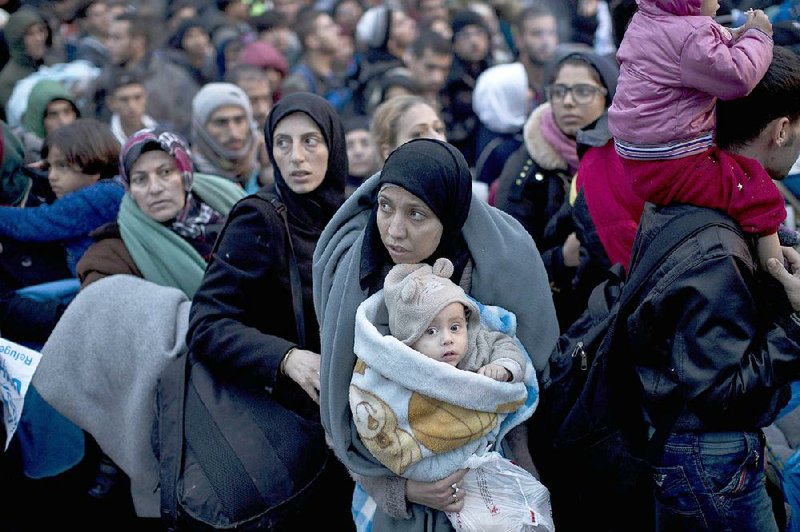VIENNA -- Migrants traded punches and scuffled with police at a Serbian border crossing, and a man was stabbed in a similar clash on the Slovenian border Thursday.
Slovenian police said the stabbing took place near Rigonci earlier in the day, and the victim was given medical treatment.
The unrest at Berkasovo village on the Serbian border subsided after several minutes. But the outbreak reflected the frustrations of the tens of thousands of people facing long waits and other hardships as they make their way north over the Balkans each day in search of better lives in European Union countries.
Farther along that route, Austrian police moved to relieve pent-up pressure -- which they feared could lead to violence -- by removing barriers at an overcrowded collection point at a border crossing with Slovenia. A day earlier, thousands of migrants broke through police obstacles at the same collection center at the Spielfeld border point.
Many of the migrants spilled out of the facility Thursday but then gathered nearby, following police instructions. But many others walked away from the border.
The collection area just inside the Austrian border was again full by afternoon. Police and soldiers struggled to maintain order as the crowd surged every time a group was separated for transport by bus to shelters and processing.
Trampled, pushed or otherwise hurt, several people were seen receiving medical attention, including one boy, about 8 years old, whose leg was being bandaged, and a younger boy being given oxygen. At least two adults were taken away on stretchers.
A police officer with a loudspeaker urged people to sit and wait for buses, warning "if you make trouble, we make trouble."
On the Slovenian side, more than 1,000 migrants were waiting for entry, either to apply for asylum in Austria or to travel to other EU nations.
The flow of people over the so-called west Balkans route that begins in Greece has shifted. Migrants still cross first into Macedonia and then Serbia, but now they enter Croatia instead of Hungary, which erected a fence along its border to Serbia. From Croatia, they move to Slovenia, which has struggled to deal with the increasing numbers.
In Serbia, groups of migrants huddled around fires lit to combat the chill at Berkasovo village. Niklas Stoerup Agerup of the United Nations' refugee agency said the number of migrant families with children under the age of 5 traveling into Croatia has been increasing over the past several weeks.
Overnight and early Thursday, "we've had a continuous flow of people coming in and also a continuous flow of people managing to cross the border," he said.
Fadl Abdul, a Palestinian from Lebanon, was among those warming up at one of the fires. He said children were particularly vulnerable to the hardships.
"We can sit here, one day, two days without eat ... water, OK, no problem," said the 43-year-old in broken English. "But what about the kids? They need milk, they need to change clothes, everything."
Croatian Interior Ministry spokesman Domagoj Dzigulovic said 1,277 people arrived in Croatia from midnight until late Thursday morning. Farther north, authorities in Slovenia counted 12,616 migrants entering the country Wednesday and more than 38,000 since Saturday, when Hungary closed its border with Croatia.
Slovenian authorities say they can handle no more than 2,500 entries per day, and they have accused Croatia of sending too many migrants through. Interior Ministry officials said the country has requested European Union aid in managing the influx.
Also Thursday, the Czech Republic -- which lies off the Balkan route and has been relatively unaffected by the migrant crisis -- was the focus of criticism by the head of the U.N. refugee agency.
Zeid Raad al-Hussein suggested the Czech Republic systemically violates the human rights of migrants. Zeid singled out the Bela-Jezova center, where migrants are detained with their children.
The Czech Republic's ombudsman condemned conditions in the detention facility last week, saying they violate the U.N.'s Convention on the Rights of the Child and the European Convention on Human Rights.
His office took aim in particular Thursday at detention facilities such as Bela-Jezova north of Prague, saying that even Czech Justice Minister Robert Pelikan has called it "worse than a prison." It cited an internal Czech report Oct. 13 saying 100 children were crammed inside when the rapporteur visited.
Zeid's office cited other reports that authorities had strip-searched some migrants to confiscate money to pay for their involuntary detention.
Speaking through his spokesman, Czech President Milos Zeman dismissed the criticism as a campaign against the Czech Republic. His spokesman, Jiri Ovcacek, said Zeman is not ready to change his critical views of Islam and the refugees.
Hungarian Prime Minister Viktor Orban also continued to advocate tough anti-immigrant measures. He told an EU People's Party Congress in Madrid that if the EU is incapable of stopping the waves of people arriving at its "eastern gate" of Greece, they must be stopped at its "western gate" of Hungary and Slovenia.
Information for this article was contributed by Masha Macpherson and Sabina Niksic of The Associated Press.
A Section on 10/23/2015

